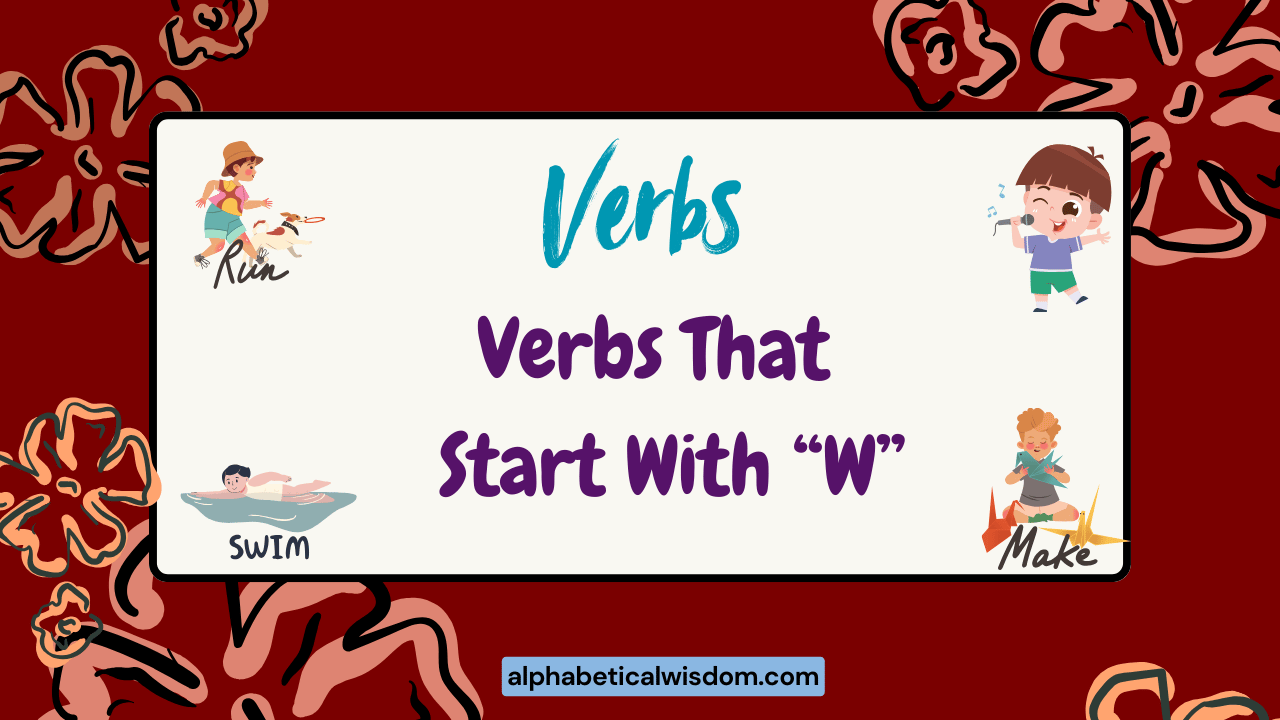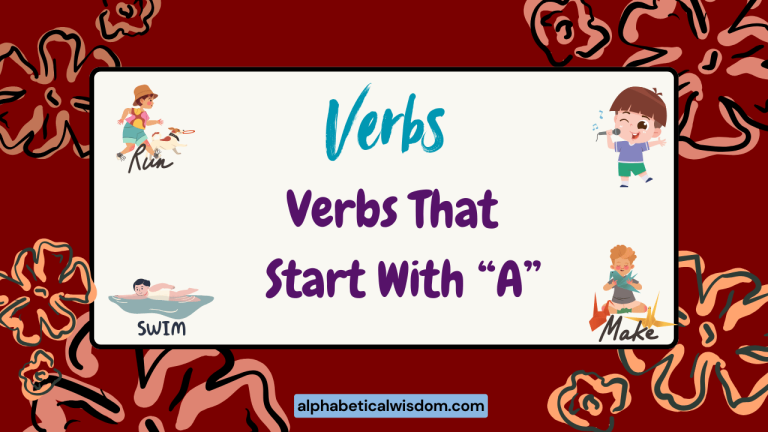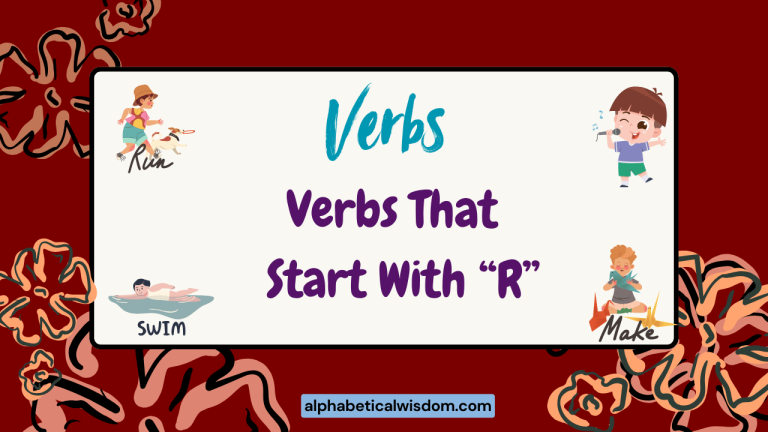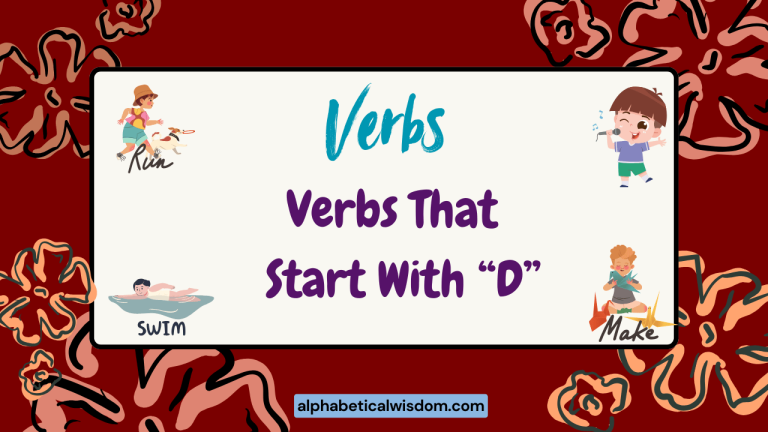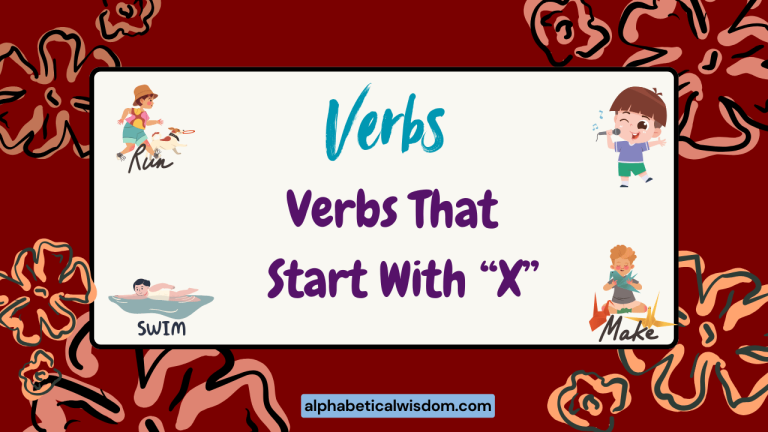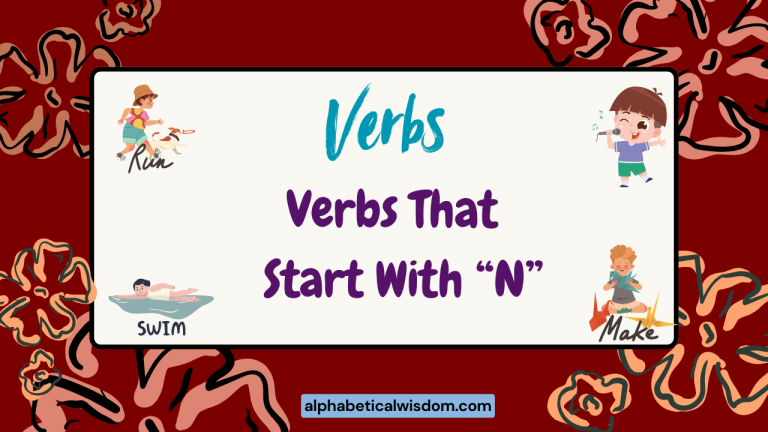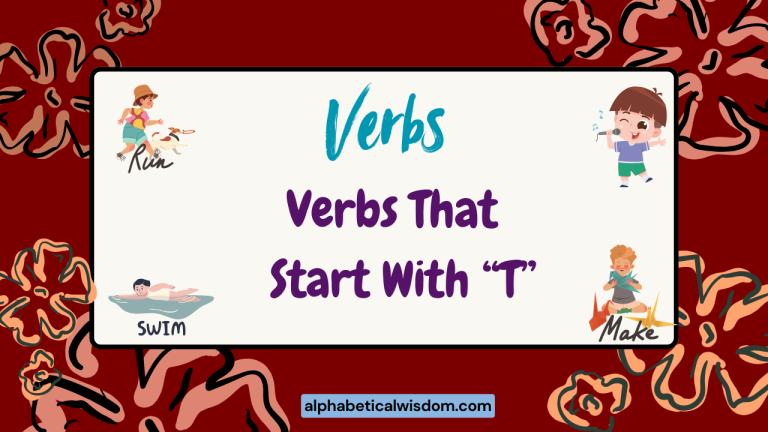Verbs That Start With W: A Comprehensive Guide
Verbs are the action words of the English language, bringing life and movement to our sentences. Understanding the nuances of different verbs, especially those starting with the letter ‘W,’ can significantly enhance your ability to express yourself clearly and effectively.
This article provides a comprehensive overview of verbs that start with ‘W,’ exploring their definitions, usage, and common pitfalls. Whether you’re a beginner or an advanced learner, this guide will help you master these essential verbs and improve your overall command of English grammar.
This guide is designed for English language learners of all levels, from beginners seeking to expand their basic vocabulary to advanced speakers aiming to refine their understanding of verb usage. Native English speakers may also find it useful for brushing up on less common verbs and understanding the nuances of their application.
Table of Contents
- Introduction
- Definition of Verbs Starting With ‘W’
- Structural Breakdown of ‘W’ Verbs
- Types and Categories of ‘W’ Verbs
- Examples of ‘W’ Verbs
- Usage Rules for ‘W’ Verbs
- Common Mistakes with ‘W’ Verbs
- Practice Exercises
- Advanced Topics
- FAQ
- Conclusion
Definition of Verbs Starting With ‘W’
Verbs starting with the letter ‘W’ are action words or state-of-being indicators that, like all verbs, function as the core of a sentence’s predicate. They describe what the subject of the sentence is doing, experiencing, or being.
These verbs can be classified based on their function (action, linking, auxiliary) and their transitivity (transitive, intransitive). Understanding these classifications is crucial for using ‘W’ verbs correctly.
Classification: ‘W’ verbs can be classified into several categories based on their function and behavior within a sentence. These include action verbs (e.g., walk, write), linking verbs (e.g., wax), auxiliary verbs (e.g., was, were in some contexts), and verbs that can be either transitive or intransitive (e.g., wave, wash).
Function: The primary function of a ‘W’ verb is to express an action, occurrence, or state of being related to the subject of the sentence. The specific function depends on the verb’s meaning and how it’s used in the sentence. For example, walk describes a physical action, while warrant implies a justification or permission.
Contexts: ‘W’ verbs appear in various contexts, from everyday conversations to formal writing. The appropriate use of these verbs depends on the specific situation and the intended meaning. For example, you might whisper a secret to a friend, wield authority in a professional setting, or wonder about the mysteries of the universe.
Structural Breakdown of ‘W’ Verbs
The structure of ‘W’ verbs is similar to that of other verbs in English. They can appear in different tenses (present, past, future), aspects (simple, continuous, perfect), and moods (indicative, imperative, subjunctive).
They also follow the rules of subject-verb agreement, meaning the verb form must match the number and person of the subject.
Tense: ‘W’ verbs can be conjugated in all tenses. For example:
- Present: I walk, he/she/it walks
- Past: I walked
- Future: I will walk
Aspect: ‘W’ verbs can also be used in different aspects:
- Simple: I walk to school every day.
- Continuous: I am walking to school right now.
- Perfect: I have walked to school many times.
- Perfect Continuous: I have been walking for an hour.
Subject-Verb Agreement: It is crucial that ‘W’ verbs agree with their subjects. For example:
- Correct: She walks to school.
- Incorrect: She walk to school.
Understanding these structural elements is essential for constructing grammatically correct sentences with ‘W’ verbs.
Types and Categories of ‘W’ Verbs
Like all verbs, ‘W’ verbs can be categorized based on their function within a sentence. These categories include action verbs, linking verbs, auxiliary verbs, and transitive/intransitive verbs.
Action Verbs
Action verbs describe what the subject of the sentence is doing. They can be either physical actions (like walk or write) or mental actions (like wonder or wish).
Examples of action verbs that start with ‘W’ include:
- Walk
- Write
- Wash
- Wave
- Wield
- Win
- Whisper
- Want
- Wander
- Worry
- Wonder
- Worship
- Wrap
- Wrestle
- Wring
- Withdraw
- Witness
- Work
- Weave
Linking Verbs
Linking verbs connect the subject of the sentence to a noun or adjective that describes or identifies it. They do not express an action but rather a state of being or a condition.
While not as common, some ‘W’ verbs can function as linking verbs in specific contexts. For instance:
- Wax (in the sense of “to become”)
Example: The moon waxed full. (Here, “waxed” links the subject “moon” to the state of being “full.”)
Auxiliary Verbs
Auxiliary verbs, also known as helping verbs, assist the main verb in a sentence. They help to form different tenses, moods, and voices.
The most common ‘W’ auxiliary verbs are forms of “to be”:
- Was
- Were
Examples: I was walking. They were singing.
Transitive and Intransitive Verbs
Verbs can also be classified as transitive or intransitive, depending on whether they take a direct object.
Transitive Verbs: These verbs require a direct object to complete their meaning. The direct object receives the action of the verb.
Example: She washed the car. (The car is the direct object.)
Intransitive Verbs: These verbs do not take a direct object. They express a complete thought on their own.
Example: He walked. (There is no direct object.)
Some ‘W’ verbs can be both transitive and intransitive, depending on the context:
- Wave: She waved her hand (transitive). She waved goodbye (intransitive).
- Wash: He washed the dishes (transitive). He washed (intransitive).
Examples of ‘W’ Verbs
This section provides extensive examples of ‘W’ verbs in different contexts, categorized by their function (action, linking, auxiliary) and transitivity (transitive, intransitive).
Action Verb Examples
The following table provides examples of action verbs starting with ‘W’ used in various sentences.
Table 1: Action Verb Examples
| Verb | Example Sentence |
|---|---|
| Walk | I walk to the store every day. |
| Write | She writes novels in her free time. |
| Wash | He washes the dishes after dinner. |
| Wave | The crowd waved flags in the air. |
| Wield | The knight wielded his sword with skill. |
| Win | Our team won the championship. |
| Whisper | She whispered a secret in his ear. |
| Want | I want to travel the world. |
| Wander | They wandered through the forest. |
| Worry | Don’t worry about the small things. |
| Wonder | I wonder what the future holds. |
| Worship | They worship at the temple every Sunday. |
| Wrap | She wrapped the gift in colorful paper. |
| Wrestle | The two wrestlers wrestled for the title. |
| Wring | She wrung the water out of the cloth. |
| Withdraw | I need to withdraw some cash from the bank. |
| Witness | He witnessed the accident. |
| Work | I work from home. |
| Weave | She weaves beautiful tapestries. |
| Wallow | He tended to wallow in self-pity after a setback. |
| Waltz | The couple waltzed gracefully across the ballroom floor. |
| Warble | The bird warbled a cheerful tune in the morning. |
| Warm | She warmed her hands by the fire. |
| Warn | The lifeguard warned the swimmers about the strong currents. |
| Warrant | The evidence warrants further investigation. |
| Waste | Don’t waste your time on trivial matters. |
| Watch | They watch movies every weekend. |
Linking Verb Examples
The following table illustrates the use of ‘wax’ as a linking verb.
Table 2: Linking Verb Examples
| Verb | Example Sentence |
|---|---|
| Wax | The moon waxed full and bright. |
| Wax | His anger waxed with each passing insult. |
| Wax | The business waxed prosperous under new management. |
Auxiliary Verb Examples
The table below shows ‘was’ and ‘were’ functioning as auxiliary verbs.
Table 3: Auxiliary Verb Examples
| Verb | Example Sentence |
|---|---|
| Was | I was studying when you called. |
| Were | They were playing in the park. |
| Was | She was going to the concert. |
| Were | We were planning a surprise party. |
Transitive Verb Examples
This table showcases ‘W’ verbs used transitively, with a direct object receiving the action.
Table 4: Transitive Verb Examples
| Verb | Example Sentence |
|---|---|
| Wash | He washed the car. |
| Write | She wrote a letter. |
| Wave | She waved her hand. |
| Wield | The manager wielded his authority. |
| Win | The team won the game. |
| Wrap | She wrapped the present. |
| Want | I want a new bicycle. |
| Witness | He witnessed the crime. |
| Weave | The artist weaved a beautiful tapestry. |
Intransitive Verb Examples
The following table provides examples of intransitive ‘W’ verbs, which do not take a direct object.
Table 5: Intransitive Verb Examples
| Verb | Example Sentence |
|---|---|
| Walk | He walked slowly. |
| Wander | They wandered aimlessly. |
| Worry | She worries too much. |
| Whisper | They whispered in the back. |
| Waltz | The couple waltzed beautifully. |
| Wait | We waited patiently. |
| Weep | She wept softly. |
Usage Rules for ‘W’ Verbs
Using ‘W’ verbs correctly involves understanding and applying the fundamental rules of English grammar, including subject-verb agreement, tense consistency, and active/passive voice.
Subject-Verb Agreement
Subject-verb agreement means that the verb form must match the number and person of the subject. Singular subjects take singular verbs, and plural subjects take plural verbs.
Examples:
- Correct: She walks to school.
- Incorrect: She walk to school.
- Correct: They walk to school.
- Incorrect: They walks to school.
Tense Consistency
Tense consistency means maintaining the same tense throughout a sentence or paragraph unless there is a valid reason to change it.
Examples:
- Consistent: I walked to the store and bought some milk. (Both verbs are in the past tense.)
- Inconsistent: I walked to the store and buy some milk. (The tenses are mixed.)
Active vs. Passive Voice
Understanding the difference between active and passive voice is crucial for using ‘W’ verbs effectively.
Active Voice: The subject performs the action.
Example: She washed the car. (She is the one doing the washing.)
Passive Voice: The subject receives the action.
Example: The car was washed by her. (The car is receiving the action of being washed.)
While both voices are grammatically correct, active voice is generally preferred because it is more direct and concise.
Common Mistakes with ‘W’ Verbs
Even experienced English speakers sometimes make mistakes with ‘W’ verbs. Some common errors include incorrect tense usage, subject-verb disagreement, and confusion between transitive and intransitive verbs.
Table 6: Common Mistakes
| Incorrect | Correct | Explanation |
|---|---|---|
| She walk to school. | She walks to school. | Subject-verb agreement: singular subject “she” requires the singular verb form “walks.” |
| I was walk to the store. | I was walking to the store. | Correct tense usage: “was walking” is the past continuous tense. |
| He washed. | He washed the car. (or He washed himself.) | “Wash” is often used transitively, requiring a direct object. If used intransitively, context is important. |
| They was happy. | They were happy. | Subject-verb agreement: plural subject “they” requires the plural verb form “were.” |
| She want go to the party. | She wants to go to the party. | Correct tense usage and verb construction with “want” followed by “to + infinitive.” |
Practice Exercises
Test your understanding of ‘W’ verbs with these practice exercises.
Exercise 1: Fill in the Blanks
Fill in the blanks with the correct form of the ‘W’ verb in parentheses.
Table 7: Fill in the Blanks Exercise
| Question | Answer |
|---|---|
| 1. I ________ (walk) to school every day. | walk |
| 2. She ________ (write) a letter to her friend. | wrote |
| 3. They ________ (wash) the dishes after dinner. | washed |
| 4. He ________ (wave) goodbye to his family. | waved |
| 5. We ________ (win) the game last night. | won |
| 6. She ________ (whisper) a secret in my ear. | whispered |
| 7. I ________ (want) to travel the world. | want |
| 8. They ________ (wander) through the forest. | wandered |
| 9. Don’t ________ (worry) about the future. | worry |
| 10. I ________ (wonder) what the answer is. | wonder |
Exercise 2: Correct the Errors
Identify and correct the errors in the following sentences.
Table 8: Correct the Errors Exercise
| Incorrect Sentence | Correct Sentence |
|---|---|
| 1. She walk to the park. | She walks to the park. |
| 2. They was playing football. | They were playing football. |
| 3. I was wrote a book. | I was writing a book. (or I wrote a book.) |
| 4. He wash the car yesterday. | He washed the car yesterday. |
| 5. We wants to go home. | We want to go home. |
| 6. She worrys too much. | She worries too much. |
| 7. They was wander in the woods. | They were wandering in the woods. |
| 8. I want he to be happy. | I want him to be happy. |
| 9. He winned the race. | He won the race. |
| 10. She weaved a scarf beautiful. | She weaved a beautiful scarf. |
Exercise 3: Sentence Construction
Create sentences using the following ‘W’ verbs.
Table 9: Sentence Construction Exercise
| Verb | Example Sentence |
|---|---|
| Walk | I will walk to the library tomorrow. |
| Write | The author is writing a new book. |
| Wash | Please wash your hands before dinner. |
| Wave | The queen waved to the crowd from the balcony. |
| Win | Our team hopes to win the championship this year. |
| Whisper | Don’t whisper during the performance. |
| Want | What do you want for your birthday? |
| Wander | Tourists often wander through the old city. |
| Worry | Try not to worry about things you can’t control. |
| Wonder | I often wonder what it would be like to live on Mars. |
Advanced Topics
For advanced learners, understanding phrasal verbs and idiomatic expressions involving ‘W’ verbs can further enhance their language skills.
Phrasal Verbs with ‘W’
Phrasal verbs are combinations of a verb and a preposition or adverb that create a new meaning. Here are some examples with ‘W’ verbs:
- Wash up: To clean oneself, especially one’s hands and face. (Example: Wash up before dinner.)
- Wind up: To bring to a conclusion; to end up in a particular situation. (Example: The meeting wound up late. He wound up in the hospital after the accident.)
- Write off: To cancel a debt; to dismiss something as unimportant. (Example: The company wrote off the bad debt. Don’t write off his chances just yet.)
- Work out: To exercise; to find a solution to a problem. (Example: I work out at the gym three times a week. We need to work out a plan.)
Idiomatic Expressions with ‘W’ Verbs
Idiomatic expressions are phrases whose meaning cannot be understood from the literal meanings of the individual words. Here are some examples with ‘W’ verbs:
- Walk on eggshells: To be very careful not to offend someone. (Example: I have to walk on eggshells around my boss.)
- Wash your hands of something: To disclaim responsibility for something. (Example: I’m washing my hands of this project.)
- Win someone over: To persuade someone to support you or agree with you. (Example: He managed to win her over with his charm.)
- Wolf down: To eat something very quickly. (Example: He wolfed down his lunch.)
FAQ
Here are some frequently asked questions about ‘W’ verbs.
- What is the difference between “wander” and “wonder”?
“Wander” means to move without a specific purpose or direction, whereas “wonder” means to feel curiosity or doubt about something.
- Can “wash” be used without an object?
Yes, “wash” can be used intransitively, meaning without a direct object, especially when referring to washing oneself. For example, “I wash every morning.” However, it’s more commonly used transitively (e.g., “I wash the dishes”).
- How do I know when to use “was” or “were”?
“Was” is used with singular subjects (I, he, she, it), while “were” is used with plural subjects (we, you, they) and the second-person singular “you.”
- What are some common phrasal verbs with “work”?
Some common phrasal verbs with “work” include “work out” (exercise or solve a problem), “work on” (focus on improving something), and “work through” (resolve a problem or difficulty).
- Is “wield” only used for physical objects?
No, “wield” can also be used metaphorically to describe the use of power or influence. For example, “The manager wielded his authority to make the decision.”
- What’s the difference between “want” and “wish”?
“Want” expresses a desire for something that is realistically achievable, while “wish” expresses a desire for something that is unlikely or impossible.
- How can I improve my usage of ‘W’ verbs in writing?
Practice using them in different contexts, pay attention to subject-verb agreement and tense consistency, and read widely to observe how native speakers use these verbs.
- Are there any ‘W’ verbs that are commonly misspelled?
Yes, “worry” and “weird” are often misspelled. It’s helpful to memorize their correct spellings.
- What is the difference between “watch” and “see?”
“See” generally refers to the passive act of perceiving something with your eyes, while “watch” implies a more active and focused observation.
- Can ‘W’ verbs be used in the passive voice?
Yes, many ‘W’ verbs can be used in the passive voice. For example, “The car was washed by him” (passive) vs. “He washed the car” (active).
Conclusion
Mastering verbs that start with ‘W’ is a crucial step in enhancing your English language skills. This article has provided a comprehensive overview of these verbs, covering their definitions, classifications, usage rules, and common mistakes.
By understanding these concepts and practicing regularly, you can confidently incorporate ‘W’ verbs into your vocabulary and improve your overall fluency.
Remember to pay attention to subject-verb agreement, tense consistency, and the difference between active and passive voice. Don’t be afraid to experiment with different ‘W’ verbs in your writing and speaking, and always seek feedback to identify areas for improvement.
With consistent effort and dedication, you can master these essential verbs and communicate effectively in English.
